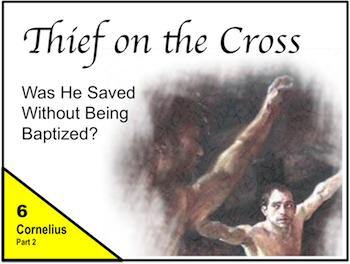Thief on the Cross - Cornelius, Part 2

Was Cornelius saved before baptism?
Acts 10 seems to be a ready-made
passage for those who desperately want to find at least one biblical example
that reduces baptism to a post-salvation symbolic act ("an outward sign of
an inward grace"). But is it possible that, in their desperation to validate
a human bias, they are distracted from the greater responsibility to submit to
the whole counsel of God?
At least 3 important questions need to be asked about the watershed moment being described in Acts 10:
Last time we looked at the first question in the list. Now let's look at the second.
2. Does Divine intervention always indicate salvation or can it simply indicate that God has employed someone or something through Divine validation?
In Acts 19, the Holy Spirit makes a clear separation between the saving power of baptism and the validating power of the Holy Spirit's gifts.
In Ephesus, Paul finds several men who were disciples, but lacked a proper baptism. It seems that, in their pursuit of Christianity, they had only been immersed into John's baptism, a baptism of repentance. Paul explains that John the Baptist's baptism lost its purpose once Jesus had come and now they needed to be baptized in the name of Christ.
It is interesting to note that in verse 5 they obeyed Paul's instructions by being baptized in the name of The Lord Jesus. Yet it was later, in verse 6, that they received the Holy Spirit gifts of tongues and prophecy.
Q: Why were the two events separated?
A: Because a person submits to baptism in order to be saved, but the Holy Spirit assigns gifts to a person in order to validate them or their message. One shows Divine healing, the other Divine employment.
Is There a Difference Between Salvation and Validation?
Is there is a difference between salvation and validation? Absolutely! Notice three examples.
- In Numbers 22:28, God made Balaam's donkey speak in tongues. Should we assume that the donkey was saved? No, God simply gave the donkey a brief moment of validation in order to employ him for a temporary job.
- In Daniel 4:28-37, God employed a pagan king to receive Divinely inspired prophetic messages through dreams. Should we conclude that Nebuchadnezzar was saved at the time of these Divine interventions? If so, then why did God punish the pagan king of Babylon for arrogantly ignoring His message? In spite of direct Divine intervention, Nebuchadnezzar was still transformed into a human animal that ate grass like an ox and grew nails like the claws of a bird. Was Nebuchadnezzar saved because God spoke through him? No, God simply gave this grass-grazing ox/king an experience of validation in order to remind him and the world that it is still God Who governs the thrones of men.
- In Acts 9, Saul (Paul) experienced a Divine intervention when he met Jesus on the road to Damascus. He experienced a second intervention when he was healed of blindness in the city. Did these miraculous signs mean that Saul was saved without baptism? If so, then why does Ananias urgently admonish him after the vision and the healing to have his sins washed away?! "And now what are you waiting for? Get up, be baptized and WASH AWAY YOUR SINS, calling on his name"? (Acts 22:16, NIV)
Since Saul's sins were not removed at the time of the miraculous events, it is safe to assume that Divine intervention does not remove the need for Divine surgery (baptism). It seems obvious that Saul's pre-baptism Divine interventions were not given to indicate salvation, but rather to validate Saul and set up Ananias so that he could urge him into the operating room. Is it possible that this is the same reason the Holy Spirit came upon Cornelius and his friends before baptism?
Next Time
Next time, we will examine the question, "Why would God introduce such an obvious anomaly into the consistent biblical pattern of assigning miraculous gifts after baptism?" Please join us then!
Missed the first five lessons in this series? Go to:
The Thief on the Cross: "Intro"
"Examples"
"Exceptions"
"Excuses"
"Cornelius, Part 1"
Want to continue this series? Go to:
The Thief on the Cross: "Cornelius, Part 3"
"Conclusion"
Back to Top of "What About the Thief on the Cross?"
Back to The Church Page
Back to Home Page


